Portugal is so beautiful and diverse that it's a challenge to pin down where the very best places to live in Portugal are. We're up for that challenge!
To a certain extent, it all depends on what your ideal is and what you consider to be your top priorities. With that said, there are some real stand-out locations in Portugal that we absolutely think you must know about.
Let's get started with the most popular and well-known region of Portugal – the stunning Algarve. After that, we'll take our journey through Portugal further north.
Secure Peace of Mind with Best-Value International Health Coverage
International Citizens Insurance provide free, no-obligation quotes from the leading international health insurance providers with plans tailored to meet your needs. Trusted by thousands of expats worldwide.
1. The Algarve: expats' favorite
For sheer popularity alone, The Algarve has to be at the top of our best places to live in Portugal list.
Forbes has acknowledged the Algarve as the most affordable place for retirees in Europe. Other advantages are the sun-filled healthy climate and some of the best beaches in Europe.
Indeed, the sunny coastal region of Algarve, home to more than 100,000 resident expat retirees, might well be one of the best places in the world to live or retire to.
Particularly appealing are the two municipalities of Silves and Lagoa.
In these two spots, you can enjoy the best the region has to offer, from medieval towns and fishing villages to open-air markets, local wine, and some of Europe’s best sandy beaches.
This is a land of cobblestoned streets and whitewashed houses with lace-patterned chimneys surrounded by fig, olive, almond, and carob trees.
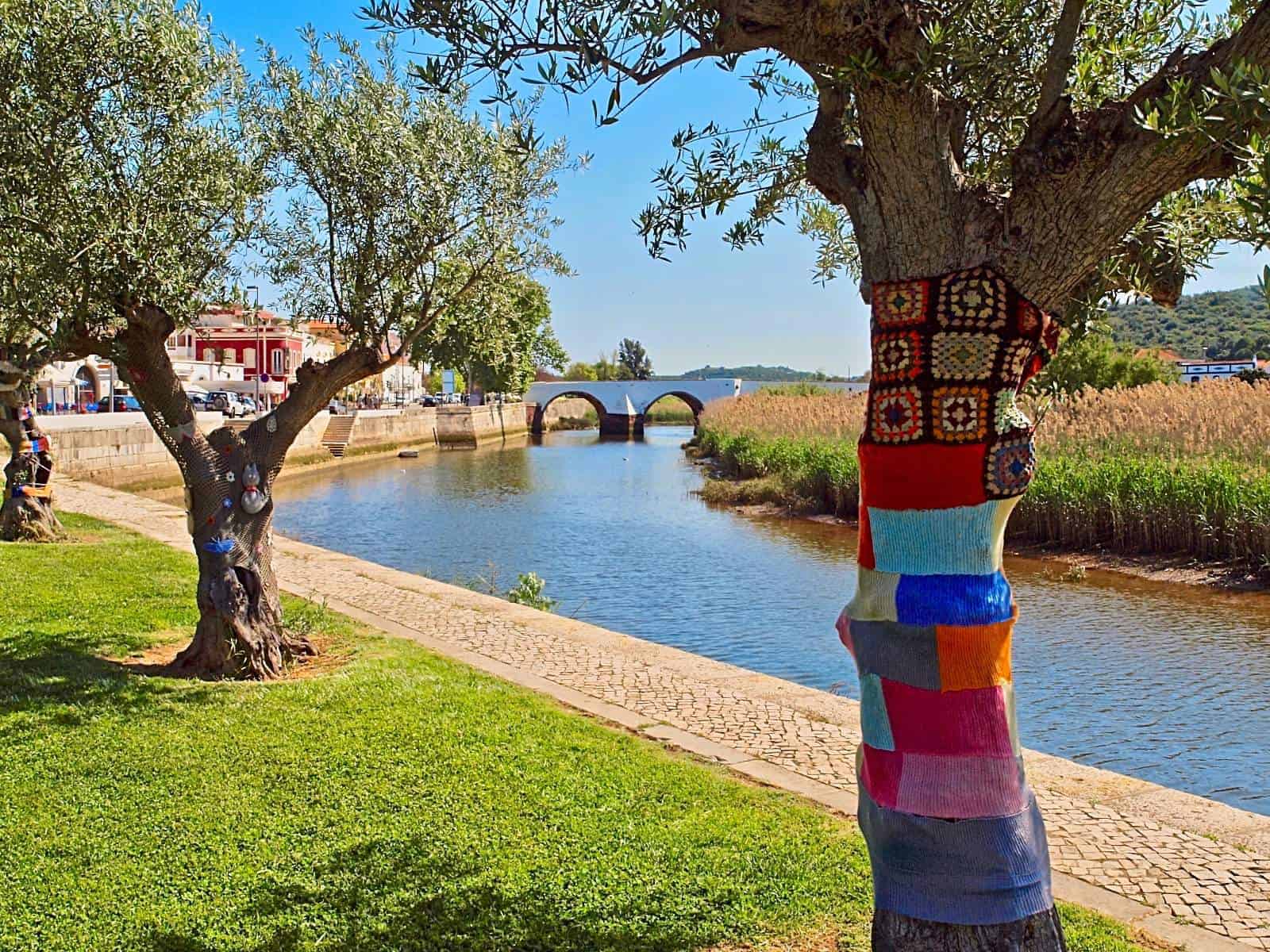
The Algarve has probably the best weather in the country and one of the most stable climates in the world. With almost 3,300 hours of sunshine per year, it enjoys more sunny days than almost anywhere else in Europe.
There is a catch, however - as a result, the Algarve has a reputation as a top tourist destination for both the Portuguese and other Europeans.
British expats particularly love the Algarve. One American expat observed the consequences of such popularity: “The Algarve is dead in winter, congested in summer, and stuffed with Brits whatever the season.”
There is, of course, a slight exaggeration to that statement, and if you are British, you probably won’t mind fellow compatriots, but on the whole, the author captured the essence of the Algarve – it is full of expats.
So if you’re looking for warm weather and a large expat community (especially British), head to the Algarve – you will find what you want there.
If you are a devoted golfer, the Algarve is definitely the right place for you. The region boasts 42 courses in less than 100 miles and is generally recognized as a top golfing destination in continental Europe and, some would say, the world.
The Algarve beaches deserve a separate mention.
If you retire there, you will have access to the best stretches of sand in the whole of Europe.
There are more than 150 beaches to choose from.
The Algarve’s 100 miles of Atlantic coastline is punctuated by the most spectacular jagged rock formations and beautiful lagoons. The water off these shores is a delightful azure, and the cliff-top views are simply breathtaking.
You can find more information in our Living In The Algarve guide.
2. Lagos and the west coastline of the Algarve
Lagos (pronounced lah-goosh), is a fantastic town in the western Algarve that attracts both expats and tourists in big numbers.
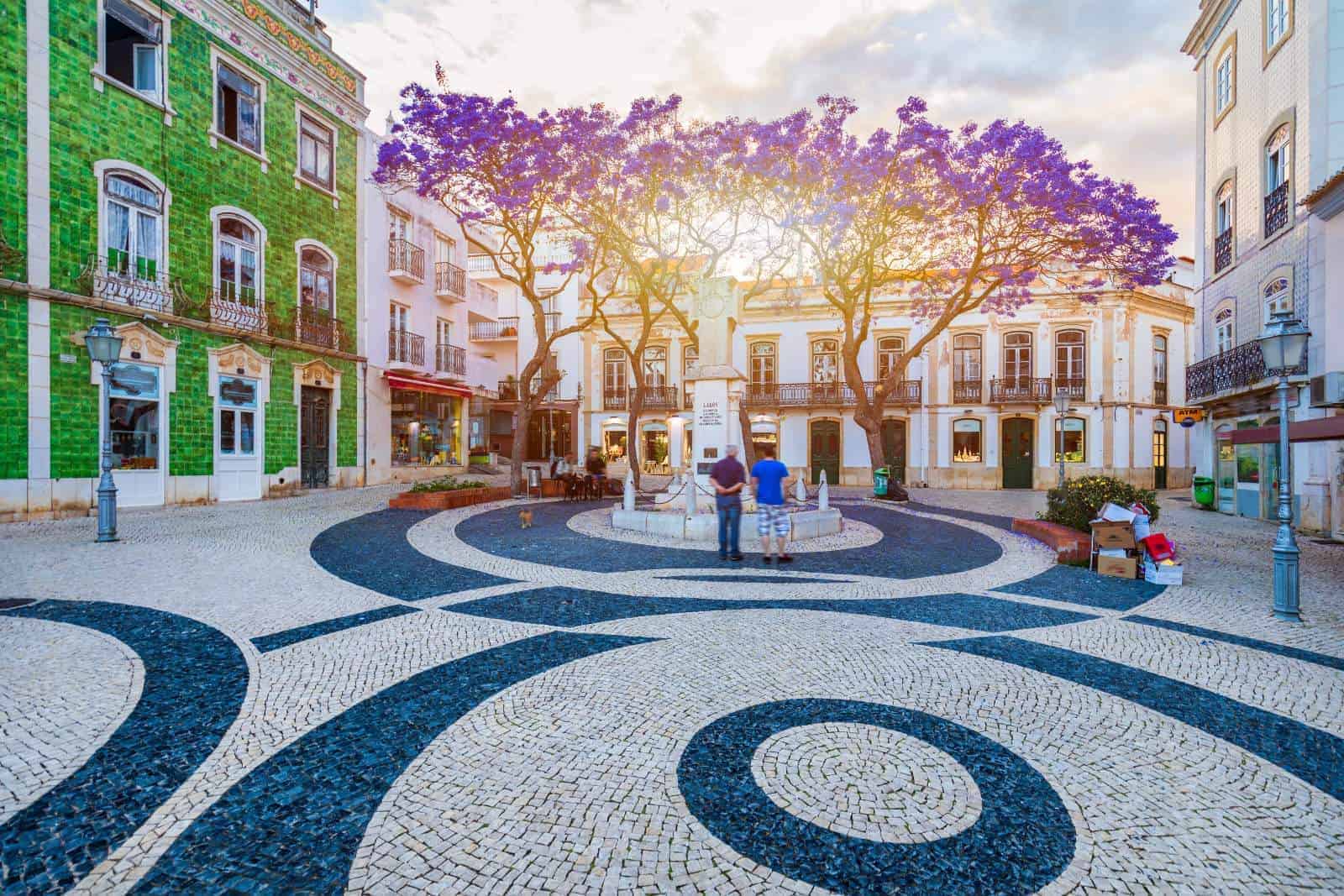
Lagos has a lot to offer: built on the bank of the Rio Bensafrim. It is a very attractive 16th-century walled town.
Its cobbled streets are lined with whitewashed houses and interrupted by pretty plazas of various sizes. Praça de Gil Eanes, for example, is usually buzzing in the evenings with live performances, music, or medieval fairs of all sorts.
When Portugal plays football or there is a major competition, the cafes will have big screens up in the square for everyone to watch and cheer.
The town is full of really good and inexpensive restaurants, the beaches around it are simply stunning, and during the tourist season, there is a lot going on, including open-air concerts and a pretty active nightlife.
If you go along the coast west of Lagos, as far as Sagres, you will find that it is one of the least spoiled parts of the Algarve. This is because the territory belongs to the Nature Park - the Parque Natural da Costa Vicentina, and large buildings are not allowed on the coastline west of Burgau.
As a result, there are no high-rise buildings or large and noisy resorts, and the whole area west of Luz at Burgau and Salema remains largely peaceful and low-key.
Most of the coast is linked by a coastal path, and you can easily walk between the villages. Salema to Luz or Luz to Lagos are particularly beautiful routes.
3. Faro - the Algarve capital
If the busy and somewhat hectic atmosphere of the western Algarve is a bit too much for your liking, head to Faro and see what you think of it.
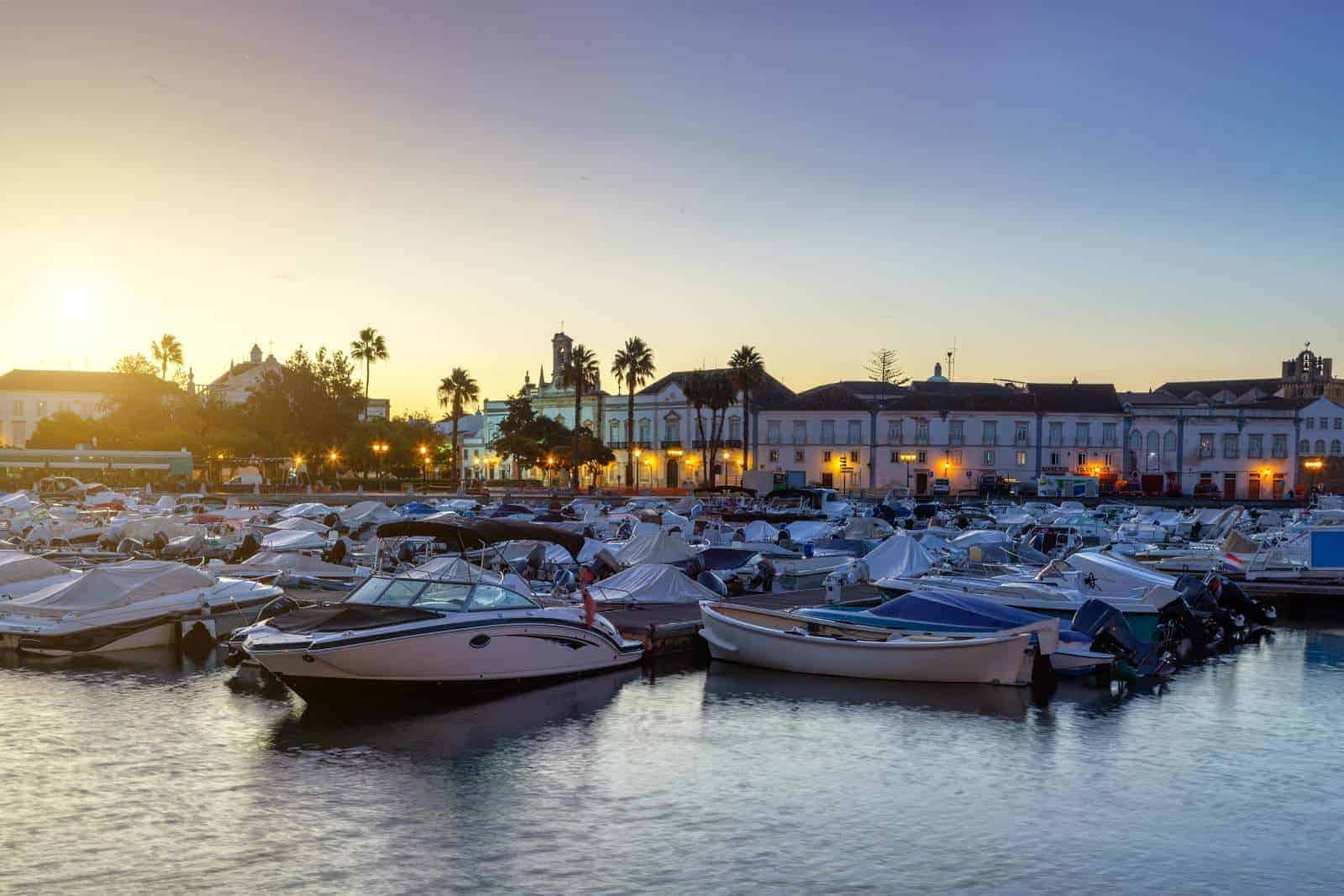
Faro is quite different from its western neighbors. It has an international airport, a modern shopping center, and high-rise apartment blocks, so it’s easy to get something of a big-city vibe living there.
It’s also a university city, so unlike the tourist areas to the west, Faro is full of life all year round, especially during term time.
It’s not a problem to get to a beach from Faro – there are boats and buses running from the center of town to some excellent local beaches.
The closest one is a vast and sandy beach, Praia de Faro. This fabulous soft golden beach stretches for 5km along the entire sea-facing side of Ilha de Faro (Faro Island). The best bit about Praia de Faro is that it’s largely undiscovered by foreign tourists.
Faro itself is incredibly spectacular, especially within the old walled town and the area surrounding the marina.
Faro is a city full of history, great shops, restaurants and cafes, theatres and galleries, great beaches, and the Ria Formosa nature reserve on the doorstep.
The center, as is often the case with historic cities, is compact so that everything you need is within easy walking distance.
4. Lisbon: a proper capital city living
Lisbon, as you would expect, is a very cosmopolitan city. It is the perfect location for culture lovers and those who crave an active lifestyle in the cultural heart of continental Europe.
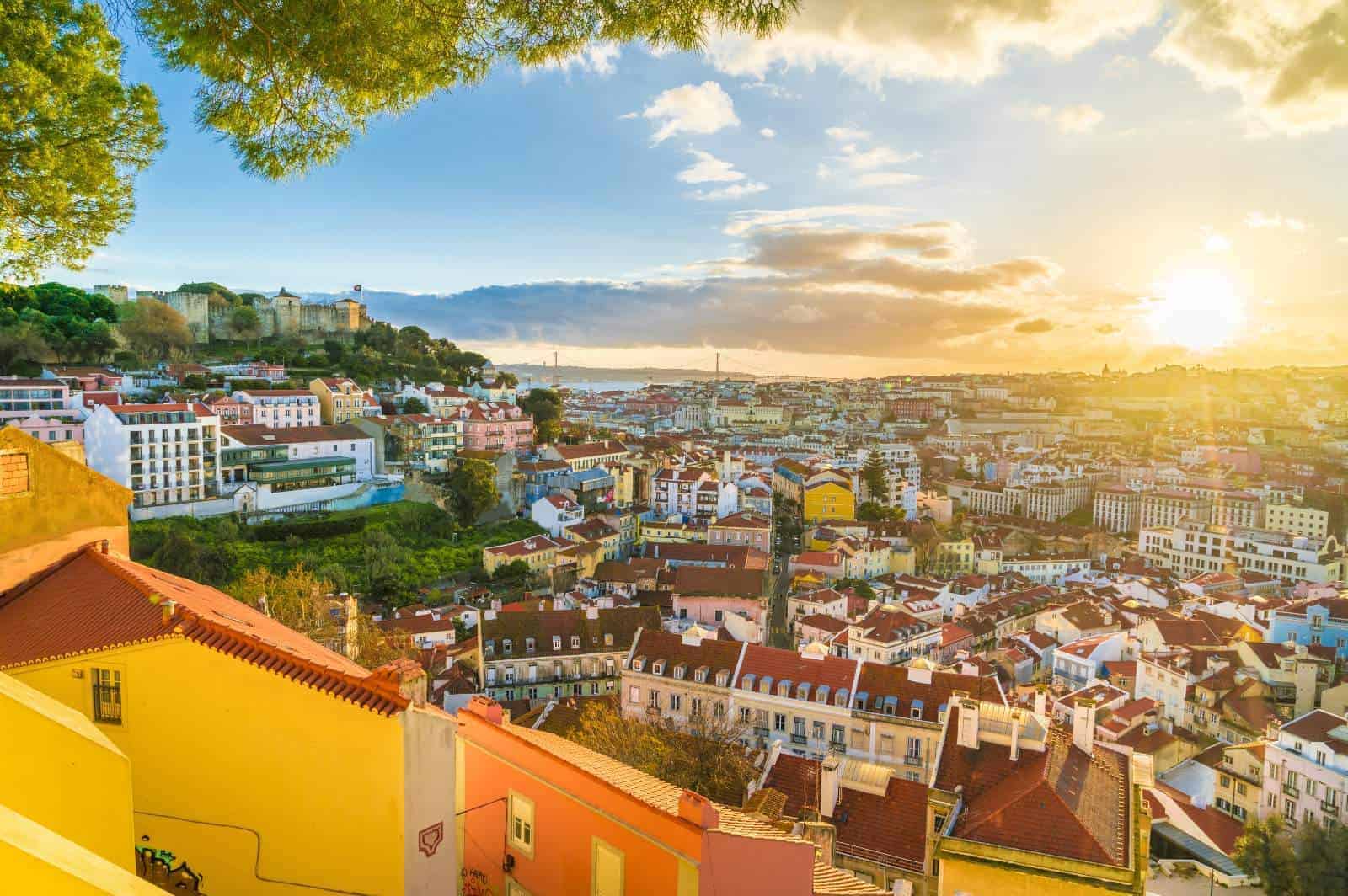
Compared to other European capitals, Lisbon is calmer and less ‘capitalized’, which is why it can be a perfect place for your retirement.
Lisbon uniquely mixes the developed infrastructure and busy cultural life, befitting a proper capital city with the quiet, almost sleepy charm of an antique town.
If the costs associated with living in a capital city scare you, the good news is you will find that Lisbon is less expensive than other European capitals.
For example, the monthly rent for 85 m2 (900 Sqft) furnished accommodation in an average (not the most expensive) area in Lisbon is around €900.
Public transport (bus and metro) is inexpensive. It means there is no real need to own a car if you live in Lisbon, so there are no petrol costs, no car insurance and servicing costs, no parking problems, and no toll charges (which can be quite hefty in Portugal).
If you have the desire to travel a lot while retired, Lisbon is perfectly positioned to be your HQ.
Firstly, it is brilliantly connected to other cities in Portugal, as well as both Europe and Africa.
Secondly, it’s a two-and-a-half-hour flight to Paris and just over one hour to Casablanca. Plus, you’ll have your pick of bargain fares from the discounted European airlines that fly out of Lisbon airport.
In short, if you love the idea of a bustling waterfront city with all the amenities and great connections, consider living in Lisbon; you won't regret it.
For more information on Lisbon, its costs, pros and cons, and more, read our guide Living In Lisbon: 10 Key Questions To Ask Before You Move.
5. Cascais: Lisbon on sea
For those who love to frequent Lisbon but would prefer a more coastal location, Cascais might be the perfect spot.
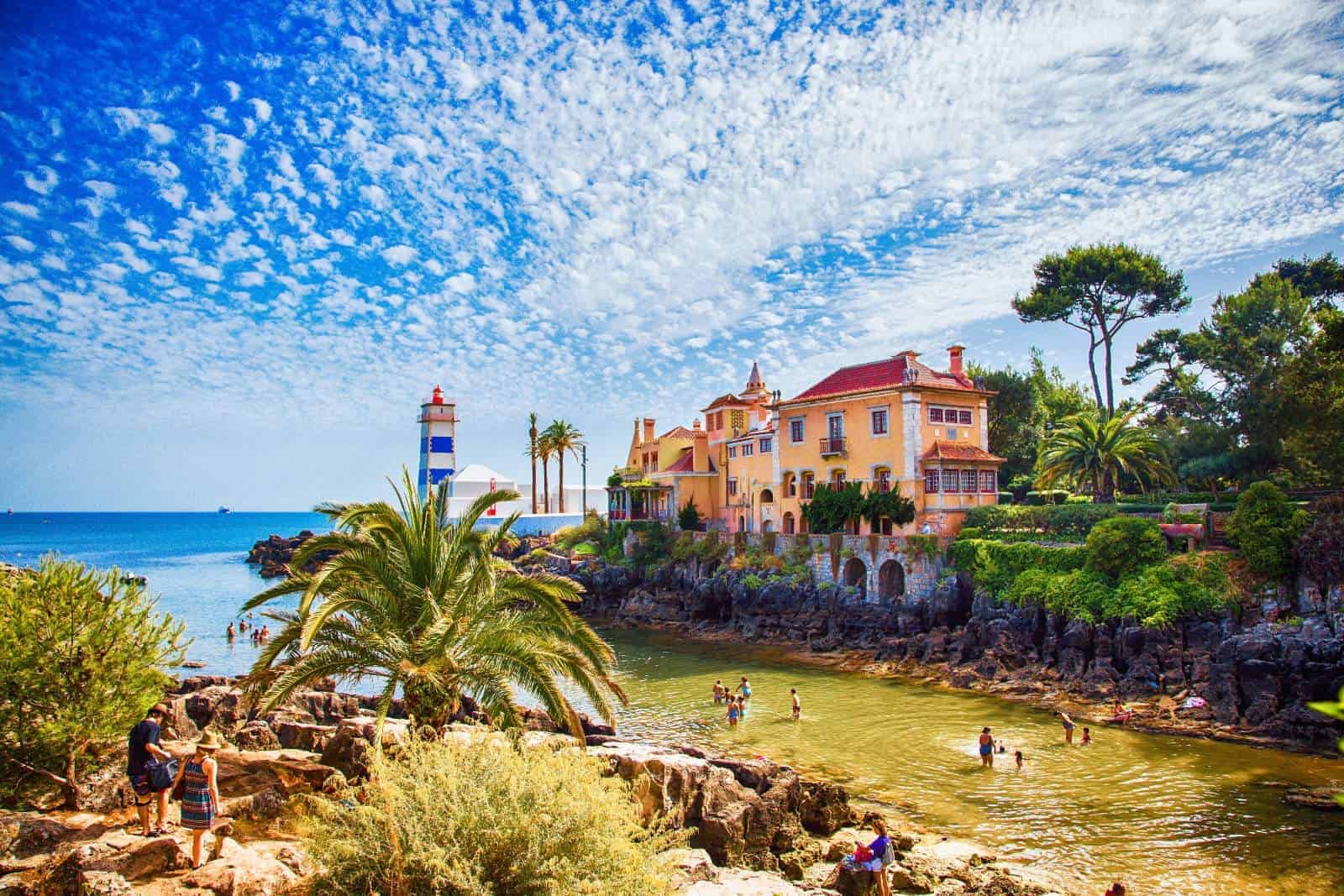
A 25-minute train ride from Lisbon, this coastal town (pronounced Cahsh-Kaish) boasts good weather, a reasonable cost of living, wonderful beaches, and a great entertainment environment.
Cascais is the final stop at the end of one of the suburban train lines out of Lisbon. It used to be a small fishing village, but in the 20th century, it transformed into a stylish beach town.
However, if you live in Cascais, you can easily pick up on its fishing past. There are plenty of colorful boats bobbing in the harbor. The daily catch is still auctioned in the harbourside square, and the fishermen can be seen mending nets on the quay.
Cascais is like a suburban continuation of Lisbon – still cosmopolitan (read: plenty of expat retirees), but more residential, closer to the coast, and full of activities for those who like to be outdoors: golf, sailing, diving, biking – you name it.
Beaches in the proximity are pretty and full of soft, beautiful sand. However, they do get crowded in summer.
The Praia do Guincho beach, a beautiful stretch of sand known for its dangerous undercurrent, is the place to go to sample what the local waters can deliver to your table.
The seafood available there is second to none, and you can try some of the more obscure Portuguese varieties, such as percebes (goose barnacles) and small lobsters known as bruxas (witches).
Not far away, there is the well-established complex of Quinta da Marinha, which boasts 18 holes of sometimes challenging seaside golf and offers horse riding as well.
And of course, having Lisbon and other great cities of Europe at your doorstep enhances your life incredibly.
For more information on Cascais, its costs, best areas, pros and cons, and more, read our guide 21 Must-Know Facts About Living In Cascais As An Expat.
6. Coimbra - A university town
The idea of retiring to a university town seems to be picking up and gaining popularity.
Most people nearing retirement age, they say, have fond memories of their college days – a sense of independence, anticipation, and entering adulthood.
So if you want to recreate that horizon-broadening experience and sense of adventure when retiring to Portugal, why not choose to move to Coimbra?
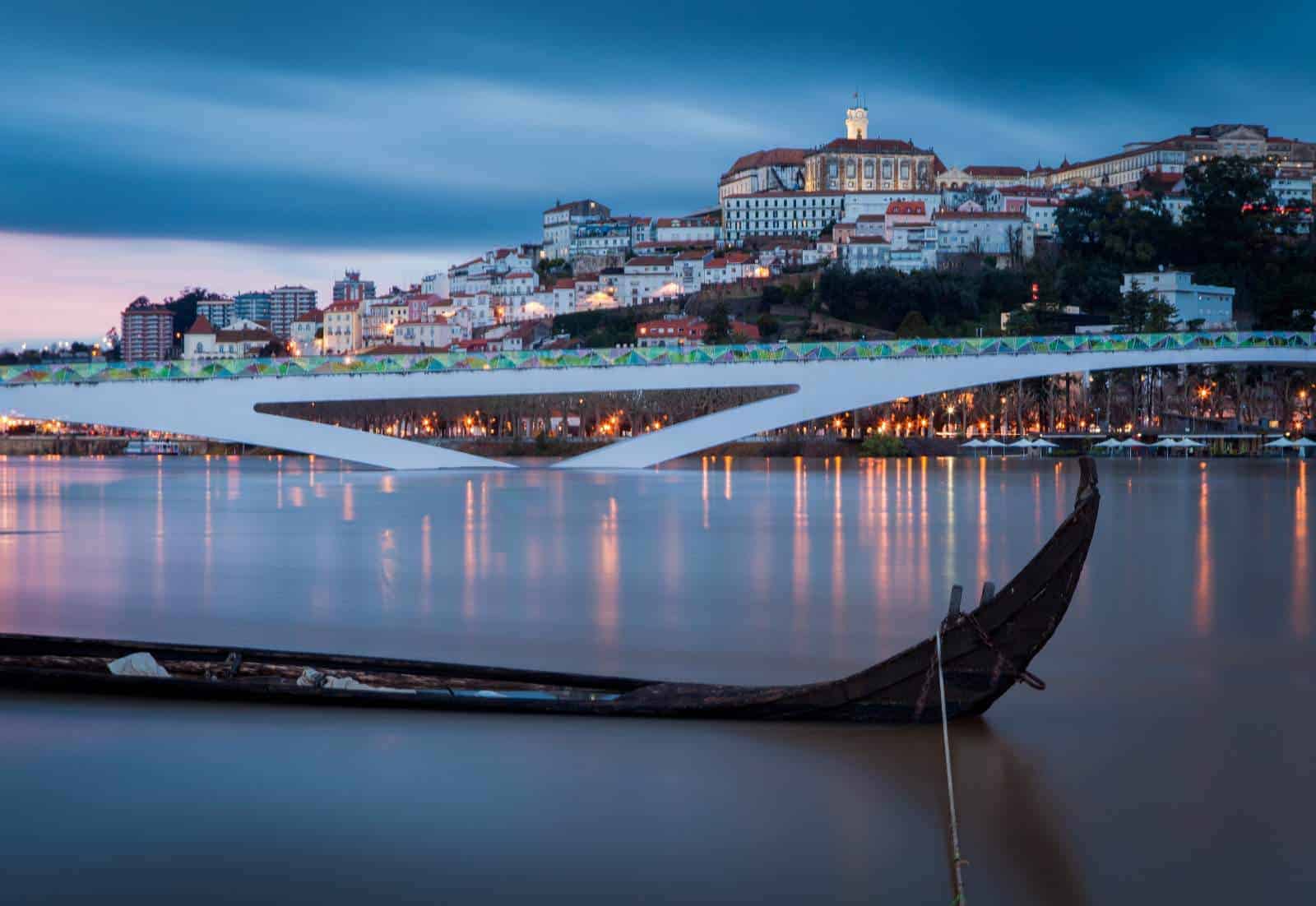
As with any university town, Coimbra boasts a stimulating atmosphere, a diverse population, a stable economy (for the most part), and lots of restaurants, shopping, and cultural events.
The place is alive with sports, activities, entertainment, and cultural and educational opportunities.
Coimbra is like Portugal’s Oxford – full of students clad in black robes and that special atmosphere that only an old European university town can have: a curious mix of mystery and modernity, a sense of belonging to a special club.
Coimbra is a very old university with great history and heritage, originally founded in 1290. In the 12th century, the town was the capital of Portugal.
Now it has a population of 106,500, and almost 25 percent of them are university students. It is a town with a mix of the old and the new – medieval churches and chill-out bars.
The town is just a 2-hour train ride away from Lisbon, so you will be able to visit the capital as often as you want.
Buying a home for your retirement is cheaper than in Lisbon or the Algarve. There is plenty of choice of houses with land and gardens around Coimbra or apartments in the city itself.
7. Porto: for wine and food lovers
Did you know that Portugal is named after its second-largest city, Porto, whose Latin name Portus Cale gradually became Portugal?
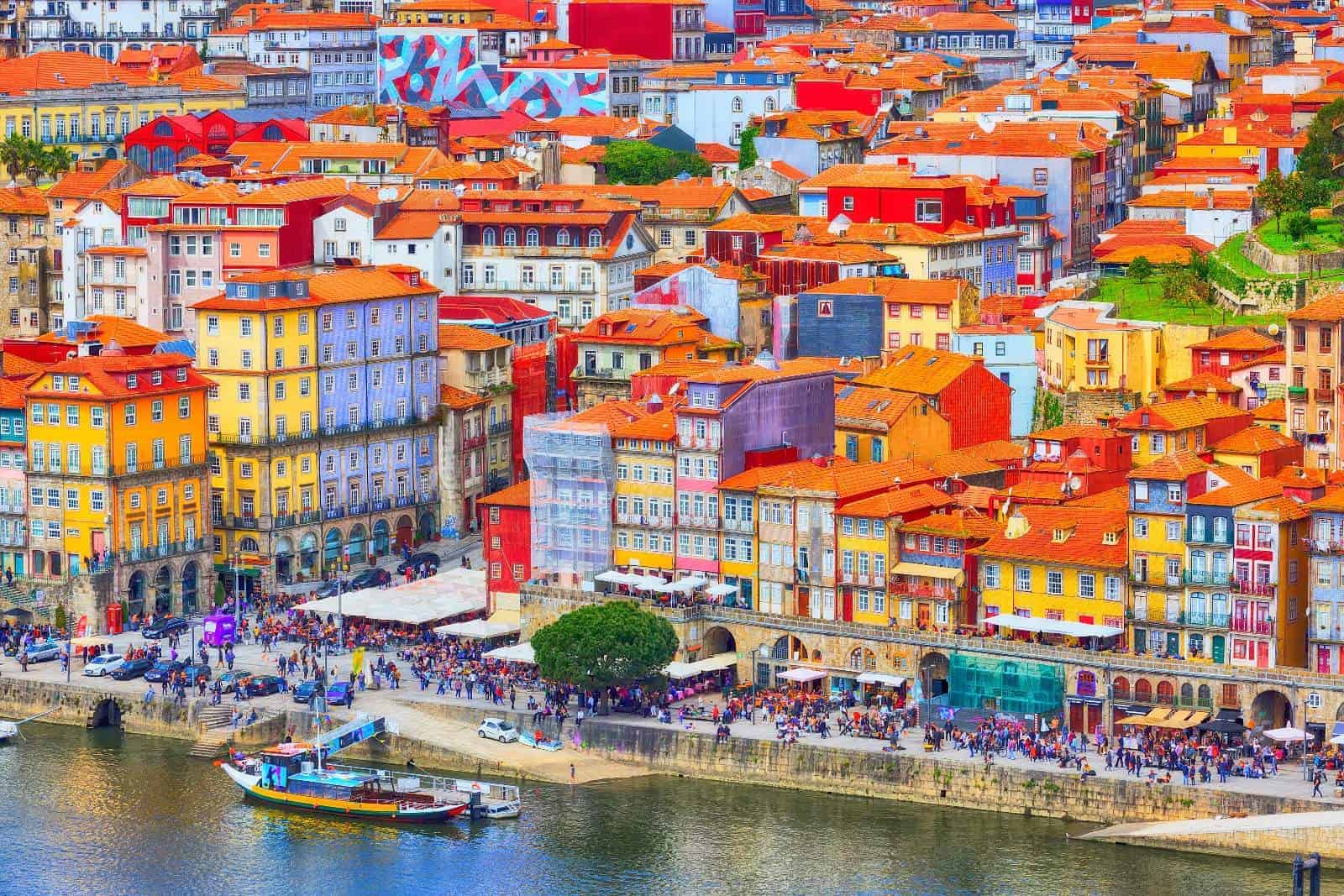
Lisbon is bustling and captivating, and the south of Portugal may well be a dream location for many of us suffering from uninspiring drizzly summers. Still, Porto shouldn’t be overlooked when considering where to retire in Portugal.
Yes, we are moving even further north now, and yes, it does rain a lot in Porto from November till March.
However, if it’s a moderate climate with lovely warm and sunny summers you are looking for if you are a wine and food connoisseur, and if you like to relish colorful ancient city centers without being baked by a powerful southern sun, Porto is the right place for you.
It might not be the hottest place in Portugal, but Porto enjoys a huge amount of sunshine during the year.
The city is definitely a gourmet delight, serving everything from caldo verde, and prince of cabbage soups to spicy sausage dishes. It’s also the place that turns typical Pinot Grigio drinkers into avid fans of the Douro Valley wines.
Porto has small, independent, family-owned shops, cafes, and vintage stores. There are plenty of flea markets that sell vintage stuff.
With its quieter and more contemplative attitude, Porto is probably more fado (fatalistic) than anywhere else in Portugal.
It’s less refined than Lisbon. Life in Porto is simpler, unpretentious, and some back streets are downright scruffy and dirty. But the charm of the city is irresistible, and for many, it is impossible not to fall in love with Porto.
For more information on Porto, its pros and cons for expats, the best areas, costs, and more, read our guide Living In Porto For Expats: The Pros & Cons You Must Know.
8. Madeira: island life at its best
Famous for its wine (among other things), Madeira is an island archipelago roughly 250 miles away from the Canary Islands. It’s connected to Portugal only in the most technical sense, although this is most evident in the culture.
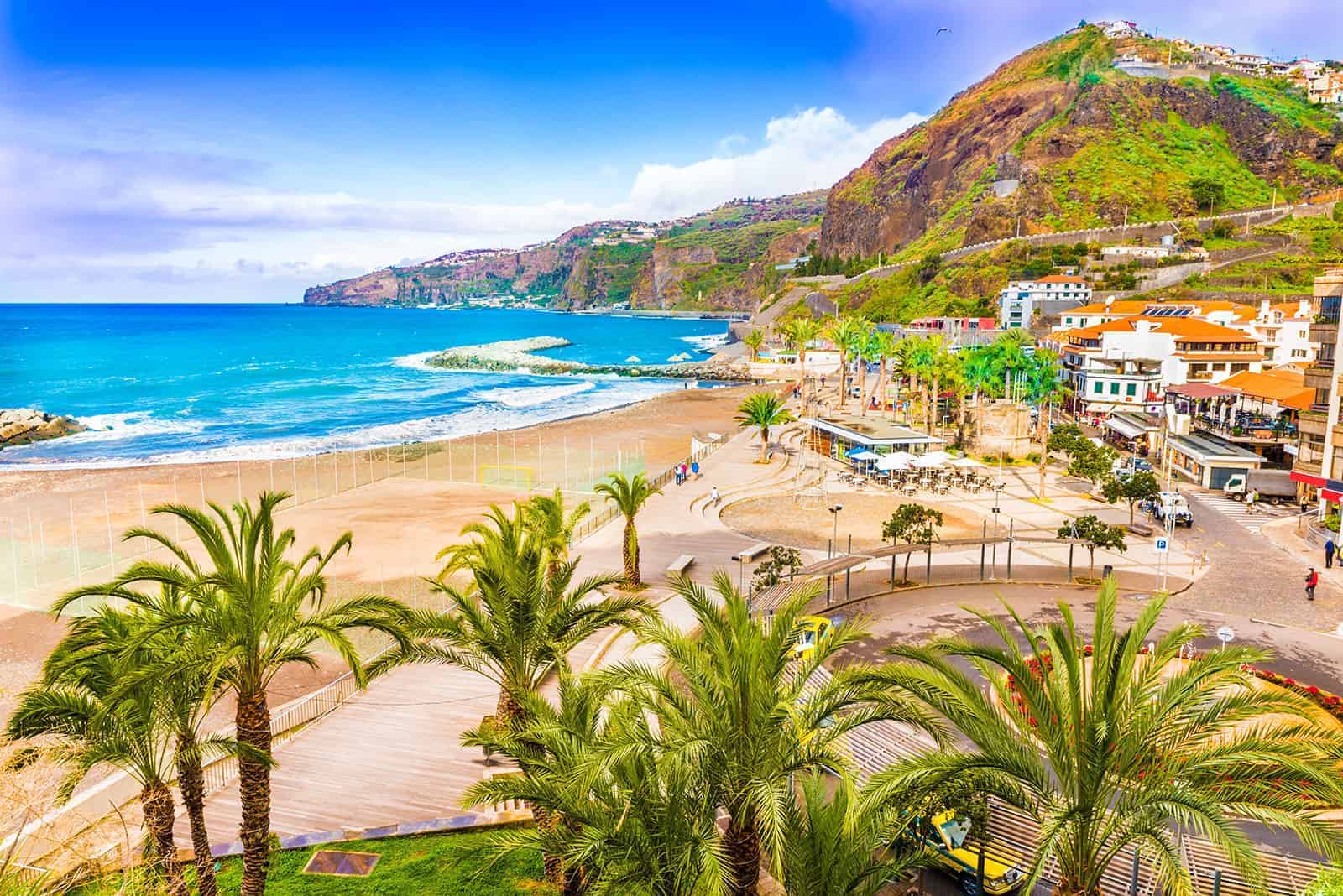
It’s a popular tourist destination – it receives more than six times its population in tourists each year!
Of course, this could either be a massive benefit or a drawback depending on your perspective. Madeira would be perfect for setting up a business, but perhaps not ideal if you seek a destination that is quiet and peaceful all year round.
The landscape of Madeira is amazing, so much so that its forests are UNESCO World Heritage Sites. Its incredible scenery is thanks partly to the climate: it’s sub-tropical and rarely drops below 20 degrees all year.
As a self-contained island, Madeira has everything you could need for a comfortable life. Infrastructure and amenities are great, the cost of living is fairly low, and the island is known worldwide for its cuisine. A lot of the shops and businesses are catered to tourism, but, as a local, it won’t take you long to find the hidden gems.
Overall, Madeira has plenty to offer those looking for a Portuguese life with a twist. Madeira is laid back and warm and has a thriving expat community and local cultural scene.
You will find more information about this wonderful island and what expat life here is like in our Living In Madeira guide.
9. The Azores: proper remote living
Remoteness might not sound appealing to some, but it certainly has its benefits. For starters, it can lead to tighter-knit communities, peaceful living, and fascinating culture. Well, the Azores have all this and more!
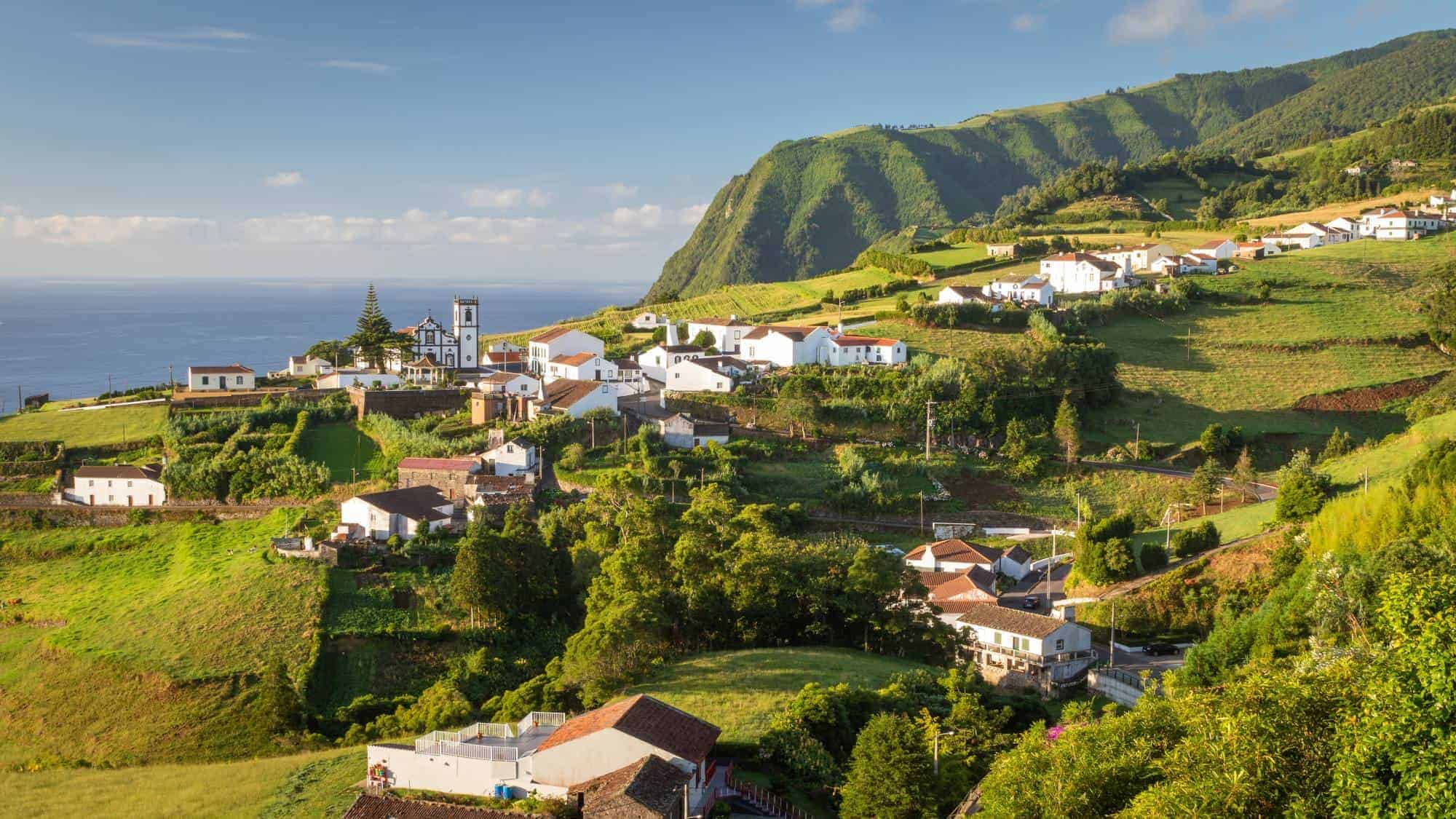
The Azores are Portugal’s second autonomous region (along with Madeira). The region consists of 9 islands, nearly 900 miles away from Lisbon. The nine islands come in 3 clusters, but they all share great weather and an incredibly low cost of living.
Although the islands are far away from mainland Europe, there are decent connections. You’ll find three major airports on the archipelago with regular flights across the continent. There are also ferries to mainland Portugal.
Despite there being so many islands, most of the region’s population centers on 3:
- Sao Miguel
- Terceira
- Santa Maria
The first two are the most popular with expats, while Santa Maria is more tranquil and less urban. English is fairly widely spoken on the larger islands, but learning some Portuguese would take you a long way.
There’s really not much negative to say about living in the Azores that doesn’t apply to the rest of Portugal. Bureaucracy can take a long time, but this isn’t unique. If you’re happy with the region’s isolation, the Azores have plenty to offer for an interesting retirement.
For more information, read our Best Places To Live In Tha Azores guide.
10. Aveiro: the Venice of Portugal
You could look at pictures of Aveiro and easily mistake it for Venice. The historic city, located on the west coast, is famous for its network of canals that offer a novel way of getting around.
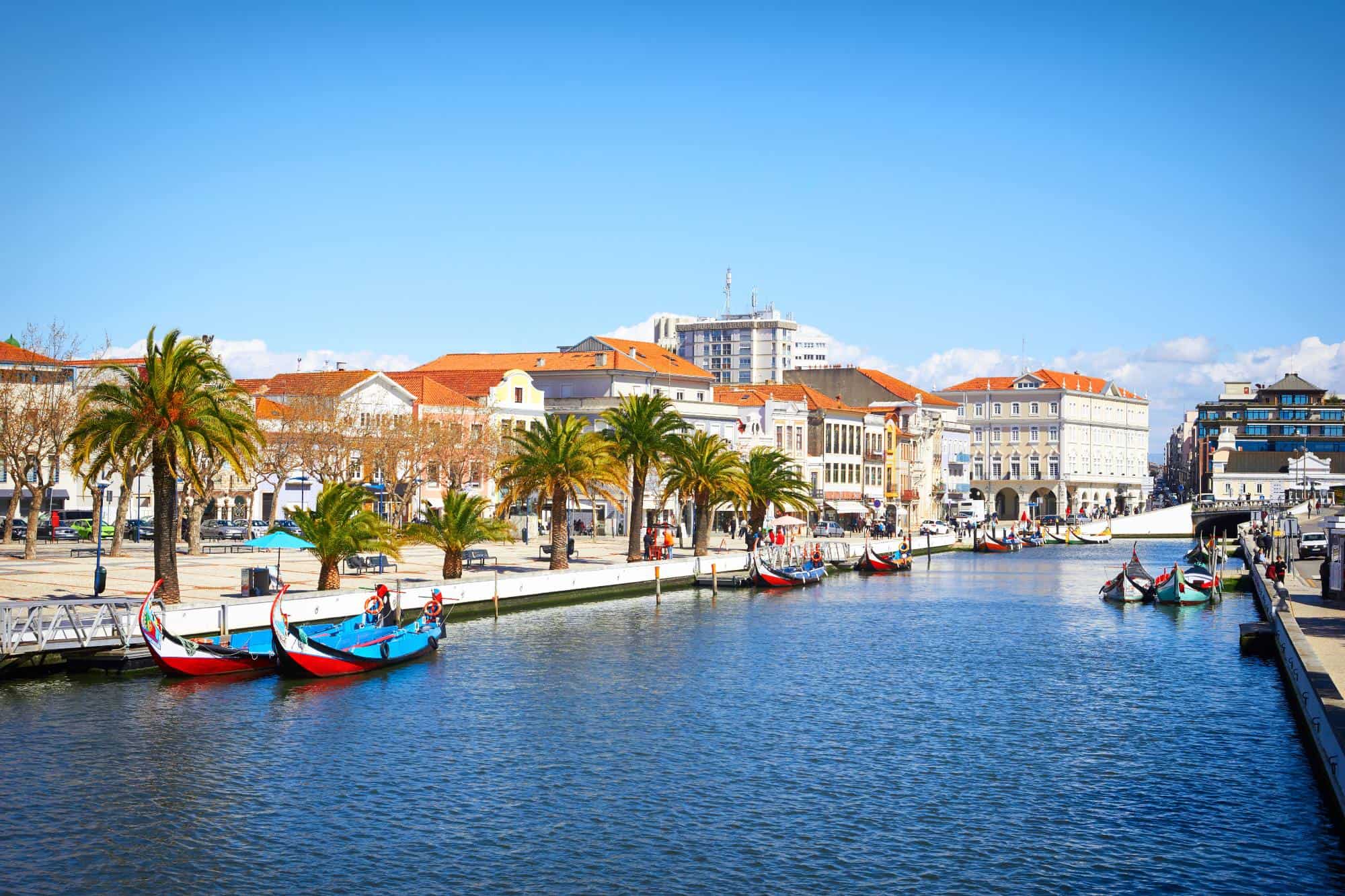
After Coimbra, it’s the second-most populous city in Portugal’s central region. There’s no denying it’s a bustling city, but this simply makes it an interesting place to live. In short, you definitely won’t run out of things to do!
One of Aveiro’s main draws is that it’s flat and mostly pedestrianized. While nothing would stop you from having a car, you don’t need one to get around the city center and its outlying suburbs. As such, Aveiro would be a great choice for anyone with mobility restrictions.
As it’s on the coast, its climate is stable but still warm. The average temperature ranges between 5 and 25C degrees, making it ideal if you don’t want to deal with the scorching temperatures you’ll find in the south of Portugal.
Property in Aveiro is surprisingly affordable, as are things like food and drink. You’ll find a range of great restaurants and bars in the city, most of which serve fresh, local seafood. You could even finish off your meal with a walk in one of the city’s many parks or, of course, a gondola ride!
Find out more about this wonderful city, its costs, pros and cons, best areas to live and more in our Living In Aveiro guide.
Final thoughts on the best places to live in Portugal
As Portugal is gaining in popularity as a good value-for-money retirement destination, more and more locations are being ‘discovered’ by expatriates looking for their perfect retirement destination.
You might want to consider living in the resort town of Sintra just outside of Lisbon, the whole district of Setubal that is full of Roman heritage, Braga, famous for its chilled lifestyle and attractive property prices, or the tiny town of Chaves, renowned for its spas, or dozens of other attractive locations found in Portugal.
The choice is huge, and there are so many locations with their own character, vibe, and lifestyle, that almost everyone can find the right place to call home in Portugal.
You might find useful:
- Living in Portugal – The Expats’ Guide – the pros and cons of living in Portugal, the cost of living, healthcare, taxes and more;
- Living In The Algarve: everything you need to know before you move;
- Taxes In Portugal– major taxes and rates;
- The Expat Guide To UK Pensions Abroad: Understand Your Options - what you can do with your UK pensions and other income when you retire abroad post Brexit.
- Haven't found what you were looking for? Contact us or comment below with your question and we'll do our best to help.
Helpful external links:
- Find out the cost of living in various regions of Portugal - Numbeo.
- Discover where the best private and public schools are in Portugal - Publico.pt.
- Portugal house prices in the most popular cities and towns - Global Property Guide.
- Find out where the sunniest places in Portugal are - CurrentResults.com
Secure Peace of Mind with Best-Value International Health Coverage
International Citizens Insurance provide free, no-obligation quotes from the leading international health insurance providers with plans tailored to meet your needs. Trusted by thousands of expats worldwide.




